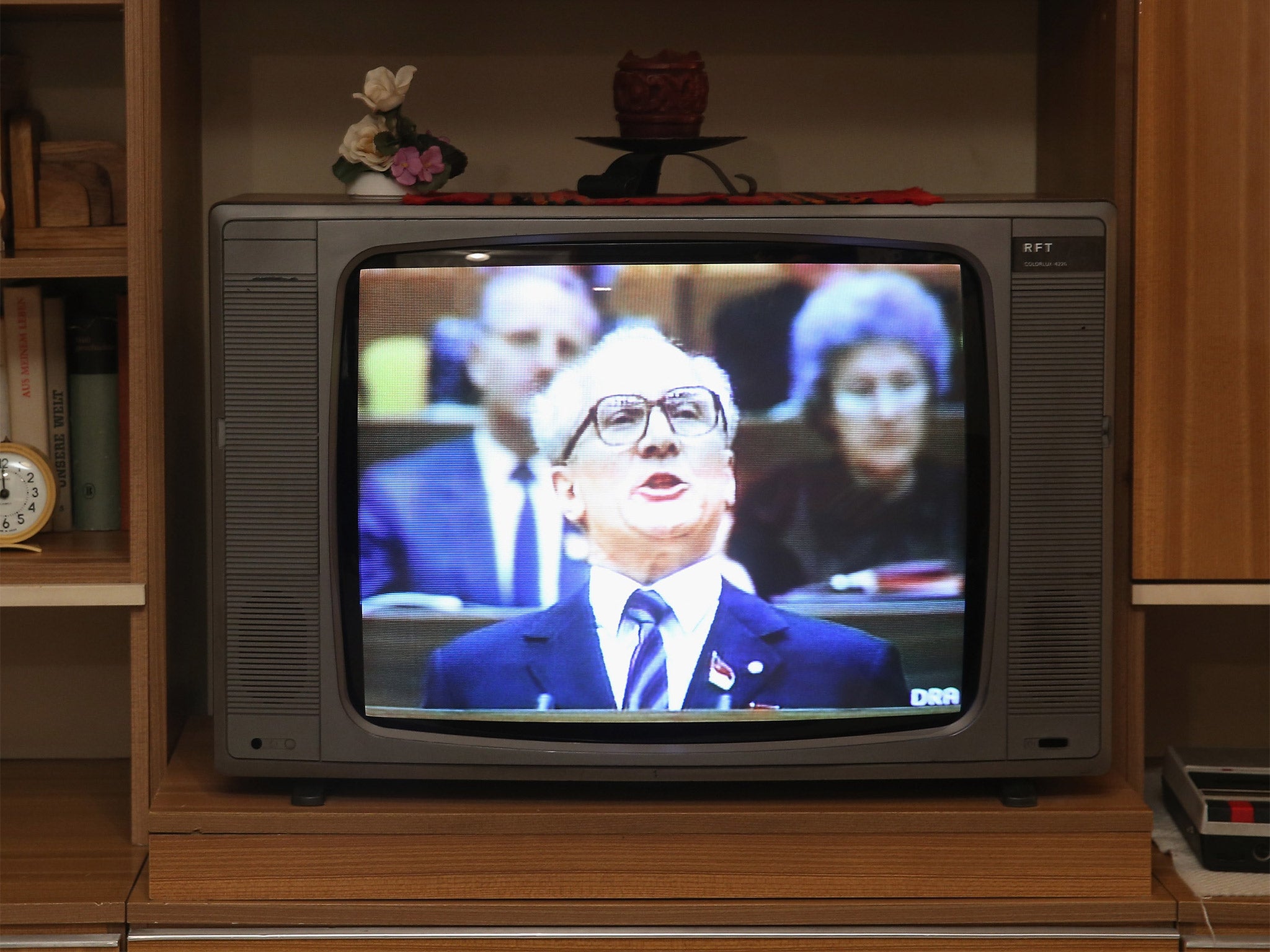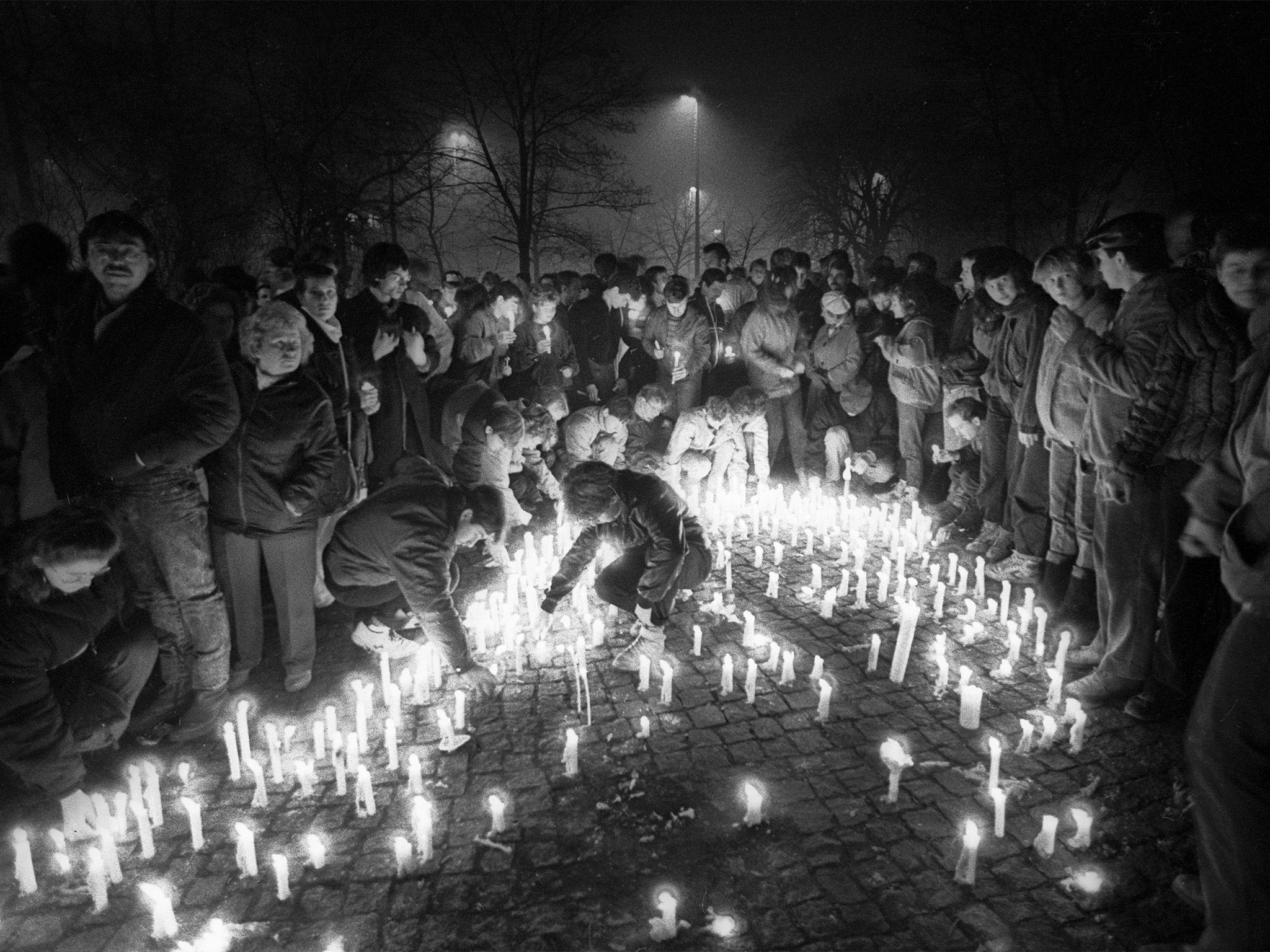Fall of the Berlin Wall: History catches up with Erich Honecker - the East German leader who praised the Iron Curtain and claimed it prevented a Third World War
Tony Paterson reflects on the man whose career was synonymous with physical separation from the West

It was the worst advertisement for Communism the world had ever seen, and scores were shot dead trying to cross it. But Erich Honecker was proud of the Berlin Wall. East Germany’s last effective leader not only built it. He sang its praises and claimed it prevented a Third World War. Yet in the end it caused his downfall.
No other German politician was more closely linked to the Berlin Wall than Honecker. By November 1989 it had become a heavily fortified ring of watchtowers, barbed-wire fencing and concrete manned by Kalashnikov-toting border guards that surrounded the capitalist, democratic island of West Berlin for 96 miles.
In the months before it finally fell, Honecker remained convinced that it would still be standing long after his death: in January 1989 he boasted to a western journalist: “The Wall will still be standing in 50 and even in 100 years – if the reasons for it have not been removed by then.”
Honecker was not alone with his conviction, and he may have had more reason to hold it than anyone else. In the early hours of 13 August 1961, as a leading East German Politburo member, he masterminded the initial construction of what the Communists euphemistically referred to as the “anti-fascist protection barrier”.
Hundreds of so-called workers’ militia troops were ordered out on to the streets of East Berlin, where they began building crude barriers on the dividing line separating the capitalist West from the communist Eastern half of the city. This was the beginning of the Berlin Wall, which would live on for more than a quarter of a century. It took the world almost completely by surprise.
Throughout the summer of 1961, thousands of East Germans had been fleeing the Communist state every month, across the open border to West Berlin. By August East Germany did not have enough farm workers left to bring in the harvest. Honecker and his colleagues knew that their only option, apart from resignation, was to build a wall.
At the time, even Western politicians conceded that the Berlin Wall had stabilised a potentially explosive East-West conflict. Blind to what was to happen in the Soviet Union from the mid-1980s onwards, Honecker carried on believing this until the end.
But Mikhail Gorbachev’s arrival in the Kremlin and his conviction that reform was the only means of sustaining Communism changed everything. By the late 1980s glasnost and perestroika were a reality in the Soviet Union. In East Germany, by contrast, Honecker stubbornly refused to admit that such reforms were necessary. He told Gorbachev during one of their rare meetings: “We have done our perestroika. We have nothing to restructure.” He even saw to it that no texts on the subject were published in East Germany.
But by 1989 ordinary East Germans had noticed the wind of change blowing in from the east, and felt it keenly. Protests against the Honecker regime began. In May, citizens frustrated by the rigidity of Communism and the lack of freedom to travel west began fleeing westwards, through what was by now the first gap in the Iron Curtain: between increasingly liberal yet still Communist Hungary and capitalist Austria.
Anti-Communist demonstrations spread through East Germany in the late summer and early autumn and refugees streamed out of the country via Hungary and neighbouring eastern bloc states. On 3 October, Honecker desperately tried to stop the haemorrhage by closing off the borders to his country’s eastern neighbours.
Just a few days later Honecker, surrounded by supposedly loyal blue-shirted Free German Youth (FDJ) movement members, presided over a pompous ceremony in East Berlin marking the 40th anniversary of the founding of East Germany. It turned into a farce. Gorbachev, the principal guest, watched in astonishment as 300 FDJ members started chanting “Gorby help us! Gorby save us!”.
East German police and plain-clothed Stasi officers rounded up hundreds of other demonstrators protesting against Communism on the fringes of the official ceremony. The need for reform could hardly have been more palpable and Gorbachev told his host that change was vital: “Life punishes those who come too late,” he told Honecker. But the hardline Marxist East German leader retorted: “We will solve our problems ourselves with socialist means.”
Ten days later, at a meeting of the East German Politburo, Honecker was forced to resign – officially for reasons of “ill health”. By this stage even his Politburo comrades had realised that reform was essential if the system was to survive. They installed the former FDJ leader Egon Krenz as Honecker’s successor. Over the ensuing three weeks, however, the demands for reform from ordinary East Germans simply increased. On 4 November there was a huge anti-Communist demonstration in the centre of East Berlin amid calls for Krenz’s resignation.

The Wall finally fell on the night of 9 November. The fledgling East German administration that replaced the Communist government attempted to bring corruption charges against Honecker and placed him under house arrest. But by this time Honecker was ill and had been diagnosed with kidney cancer. He and his wife Margot were granted refuge in a Soviet military hospital outside Berlin. The couple lived in isolation and disgrace as Honecker’s health deteriorated.
Later that year, the German authorities found evidence that Honecker had personally ordered guards at the Berlin Wall to shoot escapers on sight and took steps to prosecute him. Ironically it was Gorbachev, the reforming Communist despised by Honecker, who came to the rescue. Gorbachev arranged for Honecker to be flown in secret to Moscow.
When the Soviet Union subsequently collapsed and Gorbachev was replaced by Boris Yeltsin, Honecker fled to the Chilean Embassy in Moscow, where he was granted sanctuary for seven months. Chile agreed to help Honecker because his government had helped opponents of the Pinochet regime in the 1970s. But Chile finally agreed to send him back to Germany to stand trial in July 1992. His wife Margot, who had formerly been East Germany’s hardline and hated Marxist Education Minister, was put on a direct flight to Santiago.
Honecker appeared in a West Berlin court to face the charges in December 1992. Surrounded by supporters but by now increasingly frail he gave a clenched fist Communist salute which seemed almost ridiculous. In a 70-minute statement he declared he was without judicial, legal or moral guilt and that the Berlin Wall had saved the world from a “Third World War with millions dead”. A month later, the Berlin justice authorities agreed that because of his deteriorating health, they would abandon their attempt to put him on trial.
The ailing former East German leader was flown to Santiago, where he joined his wife. He died of cancer at the age of 81 in 1994. In his last public statement, in 1993, he insisted: “Socialism is the opposite of what we now have in Germany”. He said that his “beautiful memories” of Communist East Germany were testimony of a “new and just society”.
Twenty-five years on from the fall of the Berlin Wall, few of his former countrymen who experienced East Germany would agree with that assessment.
Join our commenting forum
Join thought-provoking conversations, follow other Independent readers and see their replies
Comments